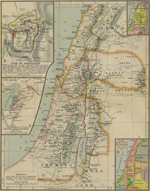|

 Explorers, Scientists &
Inventors
Explorers, Scientists &
Inventors
 Musicians, Painters &
Artists
Musicians, Painters &
Artists
 Poets, Writers &
Philosophers
Poets, Writers &
Philosophers
 Native Americans & The Wild
West
Native Americans & The Wild
West
 First Ladies
First Ladies
 Popes
Popes
 Troublemakers
Troublemakers
 Historians
Historians
 Archaeologists
Archaeologists
 Royal
Families
Royal
Families
Assassinations in History
Who
got slain, almost slain, when, how,
why, and by whom?
 Go to the
Assassination Archive
Go to the
Assassination Archive

Online History Dictionary A - Z



Voyages in History
When did what
vessel arrive with whom onboard and where
did it sink if it didn't?
 Go to the
Passage-Chart
Go to the
Passage-Chart

|
|
The Philistines
|
|
The Philistines had their origin in
Greece or Asia Minor.
Around the 12th century BC the
Philistines moved southeast and settled at the coast of ancient
Palestine.
Their land became known as Philistia,
or Philistaea.
Their main enemy were the Israelites.
Famous Philistine was the giant
Goliath who was defeated by
David, who turned out to be
their nightmare.
One of the Philistines' god was
Beelzebub.
Main cities were Gaza, Ashkelon, Ashdod, Gath, and Ekron.
And here are the maps

1250-1125 BC
Palestine

Ancient
Palestine
|
If someone calls you a Philistine
today, you might have given reason to conclude that you lack
enlightenment and culture, or you are simply a member of the enemy,
whoever that might be.
More History
|